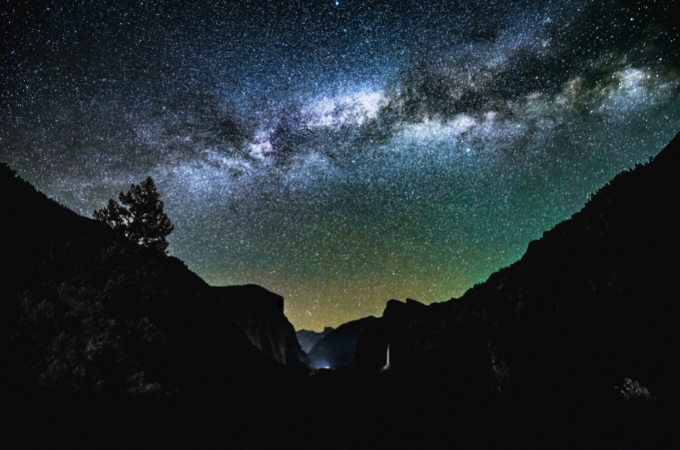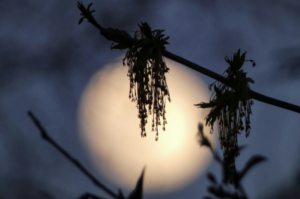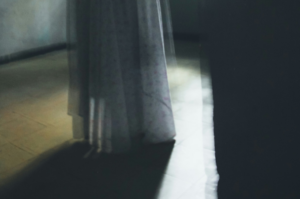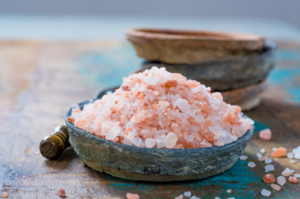
The wind howled, and with it brought a stubborn rain sifting through the holes on the ceiling. I resented my brother Madoda deeply when recalling how he had sworn up and down to find someone to help repair it. Why couldn’t he have started doing that repair job instead? Kwanele warned him that spring brought with it a lot of rain. That it would be better to fill the holes before it came. But my brother postponed. And now I sleep with a drip… drip… drip sound that goes from being an irritating gong to a relentless lullaby.
“The water drops from here,” Kwanele explained. He flattened his palm to feel the level of the puddle whilst preaching to the contractor of how serious the leak will get and how damp the room would be. I so wished he would just tie those dreads away from his face permanently. Whether it was a bun or the makeshift head rails that were fashionable to most in Ntabetsolo, I did not care. It annoyed me that his hands would constantly flick those dreads about.
“We should maybe put some covering around those holes?” Kwanele continued. “This may stop the leak from getting worse.”
After the contractor had quoted what was a steep fee, Madoda told our youngest brother Vusi and I to move the beds around. Dodge the leaks. And then he and Kwanele argued about who would pay for what. Their disagreements had a pattern. Kwanele would be the first to apologise, then Madoda would propose a solution that was near to Kwanele’s initial suggestion. This time, Madoda promised to get someone to investigate the leak problem. I held out hope that he would make good on his promise, so when the contractor came to inspect, I held my breath that a small waiting period would pass before the issue was fixed.
It was not to be. The ceiling still leaks.
As I was trying to sleep, thinking of broken promises whilst rubbing my frosty toes, I suddenly became teary-eyed and melancholic, recalling how our parents disappeared under the same weather.
The wind was furious that day. It threw the showers in every direction such that Vusi and I could not avoid it. Our walk home felt like an abysmal baptism that threatened to kill us. When eventually I reached the steel gate – calling for Ma to come and open for us – I realised the gate was locked from the inside and the fence was too slippery, too high, too many things to jump over. I had lent Vusi my jacket and whilst I questioned that foolish action, I started to taper off into irritation as I searched for a reason that would have my parents lock the gate whilst we had both yet to arrive from school. I do not recall much of what happened after that. All I can reflect on is that Vusi and I woke up one day bombarded by the presence of relatives from either side of our parents’ family coming to confiscate household items.
After that, the house was empty, save for an old reclinable three-seater, sundry items in the kitchen, smelly mattresses in the cupboards, and a pair of lopsided beds. During those invasions, Vusi and I would cede our beds to hostile older cousins. We watched with muted grief as our aunts and uncles shook our home for whatever belongings they deemed worthy to loot. Our emotional restraint from reacting to both the loss of parents and the disgorgement of our home was so convincing, that they all believed that we felt nothing for home or parents.
Madoda – the eldest brother out of the three of us – was twenty-three at the time, an electrician who was adept at fixing problems. He made decent money and was old enough to care for us. Though he did not want the responsibility, he knew there was no alternative. At times he was like our mother, swift with affection. Then at other times, he was our father, generous with beatings. The two living in one person like conjoined twins.
A year later, Kwanele moved in, and Madoda mutated into someone we’d long forgotten existed. The types of smirks that we had never seen, or imagined lost to Madoda in childhood forever, made a comeback. Kwanele summoned a curious sort of tenderness from Madoda. Much like a puppy does to children. We would feel the spongy texture of Madoda’s fast-developing pot belly. He was happy. And Vusi and I learned how sweet the caress of the afternoon breeze would get whilst sleeping on the firm branch of a deep-rooted oak tree. We knew what it was like to rest guilt-free of any unfinished chores. To have the body free from a painfully crafted belt trail, running from the back of the head right to the thighs.
The location of our parent’s whereabouts was evaporating like salt in warm morning porridge. Save for the police intermittently coming to the house with little assurances that our parents would ever be found, we were remembering to forget. At first, we welcomed the officers in blue with anxious eyes, hearts seated at the foot of their mouths. Would today be the day they close this off? Give our lives back to us as they were?
But it was always the same terrible feeling of being suspended in the air right on the peak of an inevitable free-fall. In time we resented them for coming. It felt like they tortured us. Firing an empty gun at our nervous stomachs. We, like the presumed fate of our parents, wanted to rest in peace.
The officers however insisted it was standard protocol for them to keep coming, they felt they could give us developments on how the case was going and receive feedback on the leads they were following up on. It felt glib to me. Maybe they were trying to stop us from thinking they were doing nothing. Perhaps they had already long shelved the case and were only going through the motions. I had lost interest in those conversations and preferred to sit in the bedroom whenever they came.
The last visit was during my matric year. It was nearly three years since the investigation had begun. This time, one police officer came. A woman. And behind a half-eaten meal in the kitchen, I found the courage to listen to what was being said.
She sat on the edge of the living room chair with her hat off and placed her elbows on the armrests. She talked of many things that I could not hear whilst steadying my ears to eavesdrop behind the door. But what I could discern was that the police had exhausted all available resources and the case was being closed. No hysterics flew off anyone’s eyes. Perhaps we all knew that to expect differently was useless? As the officer made her way out of the house, Kwanele held me towards him with palpable pity.
“Are you okay?” he asked.
I felt numb. The finality of the announcement made it clear to me that whatever link I had to my parents was now locked in memory and pictures. I would not see them again. I quickly accepted that.
That was nearly ten months ago to this evening.
Droplets from the roof hit my brow. Vusi and I had moved the beds, but the holes trailed behind us wherever we went. The 7:00 p.m. wind coming in from beneath the door was cold. I peeped through the window and saw the rain dancing with the blankets hung outside. Vusi, on the other hand, was his usual annoying, oblivious self, releasing stomach bubbles in between the snoring. Not at all bothered by the droplets. Nor the cold. I heard rumours in my school days that someone can get pink eye from flatulence. When sleeping so close to Vusi, the danger to my eyes was always imminent.
The rain slowed in its downpour. I left for my friend Kamva’s house. Maybe I could convince him to return with me. He would not mind. We would sleep on the couch, tell stories until we were completely worn out. I knew that Kamva’s stories were worth the toil. That his sleeping close to me was also stomach breeze-free. It was a just motivation to keep walking.
Upon arrival, I had to endure his mother scolding me for walking in the rain. Afterwards, she gave me some of Kamva’s clothes to change into. When the rain ceased completely, I used Kamva’s phone to tell Madoda that I had left. Madoda was busy reading How to Do Just about Anything, a firm favourite of his to pass the time when he couldn’t sleep. I told him that I probably would be home later.
I was good at winning Kamva over to me so I got him to agree to return with me, but first I had to indulge him in our oldest ritual. So that night, Kamva and I did what we always did. We watched the stars. Moving the beds to cusp the wall, both of us plastered our heads on the window. His late father had told us stories of how the stars are the souls of those who have walked the earth before. That if you spoke to them, they would answer you in dreams. I hoped that that would be true. But I was also frightened by the idea of someone who had died appearing in my dreams. So, I tried not to speak to any stars openly. Only whispered things in my head that I wished would come true.
I wished that Madoda and Kwanele would never leave Vusi and me. Not like our parents did. I wished Kamva and I would stay friends forever. The last wish always made me cry without warning. No matter how many times I wished. But I quickly averted the tears, turned to Kamva, and asked him his wish?
“I wish I could stay young forever,” he said. I marvelled at what he said because I thought we both wanted to see what life would be like as we got older.
“No,” he asserted when I challenged him, “my wish is to stay young forever.”
Kamva held the torch close to the ground on our way back. The road felt steeper, edgier than when I left home. We had walked it on so many nights, I did not think it possible for us to ever be lost. We missed a gaping hole by an inch. I held Kamva back, told him to watch his step. The muddy path seemed to have more revelations of puddles and sinkholes as we plodded onwards, and the wailing dogs in the distance made us a little nervous.
“Why is it like we have been walking for longer than we are used to, Zama?” he asked me. The torch’s light was fading.
“I don’t know,” I said. “But I am sure that we should reach home soon.”
The trail did not feel familiar, but we continued. I arrogantly insisted that his torch and our past experiences hiking home could not deceive us.
“Don’t be frightened,” I said. “It’s not too far now. We will get home.”
The torch went off. An agitated Kamva took out the batteries, then reinserted them. Even hit the torch a few times, but to no success.
“Can you believe it?” he said, showing it to me. “And it’s still brand new!”
He put it in his pocket and zipped it up. Then we both sat down on the grass, watching the fog blanket us. I sensed something pull at the back of my neck before we both heard a sharp noise behind us. We looked at each other with eyes gaping and alerted by fear.
“What was that?” he asked me, his voice disappearing behind his shock. The fog serendipitously uncovered a large marble rock a few meters from where we sat. Was it the star fathers we spoke of earlier signalling for us to hide behind? We did not have the time to wonder and obeyed. The noise grew more insistent as it approached. I began clutching for possibilities. Perhaps it was cats? Maybe dogs? But no dog I knew ever walked around at night howling in that manner.
The noise gradually passed, and my eyes were thirsty with curiosity. If only I could just peel Kamva off from the deathlike grip he maintained around my waist, then I would quickly peek behind the convenient protection of that rock. I could not help my neck slowly bopping to the surface like a hippopotamus in a lake. Barring the mist, I could see some four-legged animal trailing a freakishly tall being. The Being had a lanky appearance, cloaked in a bulging hooded outfit that sat on it like a hanging curtain. It seemed to glide through the mist. From the back, it had a deformed shape. Its long arms, like those of an ape, allowed its hands to reach the ground and swing its body forward.
Kamva yanked my shirt to get back down. I didn’t hear him, but he must have uttered something because I saw the Being freeze in its tracks. Like an eagle perched on a tree, it surveyed its surroundings and spotted me from a distance. It turned its neck in our direction with its eyes glistening like stray glass on a hot day. I felt my eyes wince and my heart squeeze like a sponge gripped by angry hands. My head crouched and tried to hide beneath my neck, but it was too late. The Being most certainly heard us. It looked directly at where we were hiding as if the rock that was supposedly protecting us was just a wall of lace. The Being floated closer. The noise of what sounded like crackling, burning corn and the smell of incense saturated the air. It was the same nauseating odour of an altar server passing by congregants during a church service, swinging that thurible back-and-forth like a pendulum. But the fragrance was more concentrated and suffocating in its effect.
“Don’t move,” I directed Kamva but it was too late. It found us, gazing blankly at us huddled together like rats dug up from a hole by a predator. I stared at it. Perhaps it was an old man? An old man with grey hair and patchy skin? Or was it scaly? I could not be sure. The orange-yellow colours of the eyes were deep, sunken. It spoke in clicks, an incoherent language, for a few seconds before it ran backwards as if moonwalking. Its head still transfixed on us before fading into the bushy mist.
“We have to get home,” I told Kamva immediately after it disappeared. “I don’t want that thing to return.” We haphazardly made our way out from behind the marble rock and continued a guess route in the dark, naïve in our belief that it was going to lead us home. We didn’t fear any sinkholes or other impediments. If we were injured in panic, it was better than being frozen in death.
Miraculously, we found familiar traces and trees, and there was some light. Then a tar road. As if the road was being illuminated as we walked. The fog that was as thick as the blankets hanging on my home fence, had all but vanished. All along the walkway Kamva and I trotted in silence. Comforted only by the sound of our boots. Careful not to look back and gravely certain that we would turn to salt if we did. I did not know how Kamva felt. But the blank stare he had on him told me that he did not want to talk.
“What was that?” I stuttered. Kamva looked at me still wrestling to answer the question with what was probable. We got home and knocked on the door. I thought it odd for Madoda to have locked it so early – this especially since I told him I was coming back. I could see a light beaming from Kamva’s jacket.
“Hang on,” I said pointing at it, “your torch just came on.”
Kamva opened his pocket and held the lit torch to further inspect it.
“What the fuck!” he exclaimed. “A while ago it was completely off!”
Madoda opened the door briskly and looked elated to see us. His face had seen panic and was now glad. But then he remembered his rage.
“Why couldn’t you both have stayed at Kamva’s house?” he shouted. “Do you know what time it is, Zamani? I thought you’d decided not to come back.”
I saw the clock mounted on the kitchen wall and I thought it impossible. We had left Kamva’s place at around nine o’clock. We arrived home at three in the morning. All this time we had been going around in circles. Getting lost on a route that we had used repeatedly, a route that usually took us twenty minutes.
“Is it that late?” exclaimed Kamva.
“Yes,” Madoda responded irritably. “Too late for you two to be strutting around like you were doing.”
Madoda quickly closed the door behind us and switched the light off. Kwanele was balanced on the wall at the end of the passage and asking if all was well. He rubbed his eyes and stretched whilst still fastened in strands of sleep.
“Relax,” Madoda assured him, “it’s only Zamani and Kamva.”
They both disappeared into their bedroom whilst Kamva and I found our way into mine. Vusi was sprawled out on both beds and deep in sleep.
“What the hell happened, Kamva?” I asked him. We needed to talk about it.
“I don’t know,” he said. “But I am glad that we are home, Zama.”
I was glad too. I pulled out a sponge from the cupboard and grabbed the few remaining sheets on the side chair.
“Let’s go sleep on the couch,” I said. “I will flatten it out. Put the sponge on top. It’ll be comfortable.”
There was no story to tell that night. Not from Kamva and not from me. The room was cold, but I could not feel its icy touch anymore. Especially since we had met something that was still hot in the heels of our minds. We lay close together on that sponge. Sleep took its time to come to me, and when it eventually came, it was in patchy instalments. I thought I felt a kick from Kamva during one dream.
“Yeah,” I answered as if I was being called.
I was back on the outside, on that same rock. Alone. The old-looking Being and the creature were both there. The Being held my shoulders from the back before rounding to stand in front of me and look deep into my eyes, speaking without moving its lips. I tried to avoid looking at it in the face, but it was of no use. Its blazing orange-yellow eyes were gradually erupting out of their dark sockets. It had no eyebrows, patchy scaly white skin, and the same stench of incense reeked all around it. It spoke through me. And although I could scarcely comprehend the language, my lips moved in a manner of parroting what I was hearing in my head. I was a blank canvas being imprinted on with thick dark ink. Its words became mine and a flow of my own thoughts and feelings eased, going from fear to calm and finally to hunger. Hunger for what was being said. Spontaneous words flowed through me as vomit spewing from a poisoned stomach.
Then Kamva kicked me again, disrupting the dream state. I turned on my side and clung to the sponge, bracing myself for another inevitable dream. I recall seeing a feline-looking creature playing with me on the river shore. It made catlike noises that were reminiscent of the sounds Kamva and I heard before we ducked behind the marble. I was comfortable with this four-legged animal. Only I could not make out which animal it was. I shook and felt a flood of water over my face and gasped for air. It could not be sweat.
“Zamani,” shouted Madoda. He was in a panic, and I felt myself coming to.
“What’s the matter?” I asked upon waking. “What is it?”I felt around for Kamva.
“Where is Kamva?” I asked in between his monologues. The sponge Kamva and I slept on had spontaneously sprouted steel legs, the sheets were whiter, and the room was fuller. Who were all these people behind Madoda? Where was I?
“You slept through it,” Madoda shrieked. “What happened to you?” he asked me whilst placing what I recognised as Kamva’s torch by my bedside.
I did not understand his frenzy and hoped that he would calm down. My one head had been split and in its place were two separate thoughts. Why was Madoda in such an erratic state? And where was Kamva?
“He died,” Madoda definitively stated. “He died.”
“Who died?” I asked. Madoda’s moans crowded the background.
“We have been trying to wake you for two days now,” he continued, crying. “What happened to you, Zamani?”
He continued to wail, hugging and kissing me with smothering delight.
“Days?” I asked, still in a confused state. “Kamva? Who is dead? Wake me for days?”
The aerial fan overhead swung ever slower until it felt like it came to a complete rest. My nose breathed a horrid smell of remains rejected by an upset stomach. Could it be true? It hurt to hear it. Was Kamva dead? The shock unnerved me so deeply that I wished I were dead too.
My thoughts twirled frantically above my head like flies to a fresh carcass. I felt the texture of the Cadbury wrapper on the tips of my finger, the remains of the sweet taste of the last one fading from my tongue and throat. Kwanele had given them to me to calm my nerves. He sat at a distance from me, whilst on the other end of the room I was surrounded by crowds of people, his dimpled smile trying to be as reassuring as possible. Who were these people that kept on being wherever I was?
“You have nothing to hide,” Kwanele assured me, “God is your witness.” But what if there were things that even God was asleep to?
“We came down the same road as we always did,” I started. The chair I sat on felt like small grinding stones on my crack. I struggled to remain stationary. Kamva’s mother’s eyes looked up from the black coat she was wrapped in. Her face looked sunken like a bed on its last springs. She had long divorced rest. She feared to sleep now – the only dream she had worth waking up to, was now permanently hibernating.
“We felt the road was longer than we had always found it to be. We were going around in circles. Walking the same walkway repeatedly? But the fog confused us. It made us feel tired. So, we sat on a rock to take a pause and figure out why we were so muddled by a road we had used dozens of times before.”
A random drop of water slid down my cheek. It was too late to wipe it off. I recalled Kamva and I bundled together behind that marble rock. The smell of him was still visceral. It jumped out at me like a toddler wanting to play.
“It was getting harder to see past the fog and the sounds of dogs bothered us. They were barking in a manner that we had not heard before. But we were still hopeful that we would find the path. We were not discouraged.”
I stopped for what was a long moment. The eyes in the room pressed through me impatiently, as if to say, “Go on boy. Don’t stall!”
“Then,” I continued, “the Mantindane appeared.”
The room stirred with whispers. Vusi was sitting alongside Madoda covering his head with a cap and his eyes averted from mine. A look of concern still stamped on his face. It felt strange to name the Being. It felt like I now openly acknowledged it existed. And not only had it existed, but also, that its existence preceded my own.
A dwarf-like healer was called to the house on the same day I left the hospital. The people that were crowded around Madoda were now sitting at home with me. I don’t remember the visit much. but I remembered someone saying that I was more detailed in my description of the Being while being questioned by the healer.
“The Mantindane,” the dwarf man concluded at last. His eyes were wide open with both astonishment and terror. Vusi says they could not tell which of the two expressions he showed.
His name was Yal’uluntu. He had a frightful appearance exaggerated by all his beads and furs. After his sudden assertion that my family could not challenge, Vusi said that he performed a smoky ritual throughout the house and left a cob of maize at every corner of the yard. He then glazed each of us with the blood of a chicken. He instructed that the maize must never be moved. That we were to sleep facing the windows in all rooms and ensure that all the doors were locked. This we did from that night and have not yielded since.
Now that the creature had a name, a part of me felt relieved. That all knew I did not imagine anything. Nobody would believe that I had anything to do with Kamva’s death, let alone had caused it. He was my friend. I did not get to say goodbye to him. But there was still opportunity. I also heard Kamva’s family had refused to bury him. I was thought half dead only to wake later from a “sleep.” Surely there was still a chance. A chance that, like me, Kamva was stuck in a dream state that rendered his body catatonic. Even the dwarf-like healer told his family to wait.
“And will they wait?” I asked Madoda. This question I posed right after the ritual with Yal’uluntu was performed. Kamva was the only thing that mattered in my mind. Everything else was unclear.
“We are not sure, Zamani,” he answered. “His mom and others in the family don’t want him buried. But then other family members are insistent. It is Spring now. Extremely hot. He’ll start to stink if he is not sent to a mortuary.”
“Stink?” I asked. “Where is he kept?”
“At home,” Madoda answered. “We are fearful that his mother is going crazy. The body has been kept in an iced room since you two were moved from the house. She prays all day and night. It’s all so bizarre.”
“But how was I not dead?” I asked. “How did you know to send me to the hospital instead of an iced room or the mortuary?”
“You were still breathing,” he said. “You were kicking and muttering clicks in your sleep. But this was not the case with Kamva. He was stiff. Lifeless.”
“So, she keeps him,” I said, “hoping he’ll wake too.”
It is not bizarre to me. So much has yet to be explained. And so, nothing can be called “bizarre” anymore. The Mantindane was known. And because it existed, it could be commanded or dragged in front of everyone to explain what it had done to us. We all needed answers.
“There was a smell of burning corn and incense,” I continued whilst still on the bumpy chair. “The smell was very intense and spread generously around us. It made us fearful, so we hid. Then the figure of the Mantindane with a creature walking alongside it floated past us.”
“Do you know what kind of creature it was that was walking with the Mantindane?” asked one of the Elders. She looked sceptical. Or was it the dense crease on her temple, typical of someone old? I dared not tell them about the dream I had. The one that had me playing with the very same creature on the river.
“No,” I answered. “I couldn’t make out what it was. But the Mantindane heard us. It heard us and it is the one that came towards us.”
I wanted to continue but a pounding headache was progressing. It rose above my eyes like heat from a furnace in a tightly shut room. I battled to remain alert through the last response.
Kamva’s mother suddenly burst into tears. Nobody seemed alarmed by the eruption. She did say to Madoda that she had hoped that I would tell her details of what happened. That if I could not, she would not know what to do with herself. How was she ever going to reconcile a child that went walking his friend home, as he always had, only to not wake the very next day? If it were witchcraft, then perhaps she could consult and find the culprit. If it was an accident, then she would have someone to blame. But this? This unknown creature from an unknown place came to unsuspecting children and took her son in an unknown fashion. It was too much.
The walk home after the meeting felt arduous. The path was the only gravel road there was in Ntabetsolo. The first and only development made by Council people. Madoda dreamed of becoming one of these people. He had a love of politics and, according to Kwanele, would have succeeded. This was before our parents vanished. Then suddenly he had responsibilities thrust on him. He took his electrician vocation more seriously, as there were shoes to be filled. Commitments that alienated the attempt of chasing dreams. At times I understood the resentment he felt towards us. A resentment that motivated his habitual escape to the soccer fields.
During the time that he took on the parental duties, and usually in some half-sober tale-telling, he would regale Vusi and I with stories from his soccer days. We concluded that it was in one of those fiercely watched rivalry games between Ntabetsolo and Ezibeleni, that he met Kwanele.
He told us that after every game with the visitors, he would routinely walk Kwanele to the rank so that Kwanele could catch a taxi back to Ezibeleni. On some days, he would accompany Kwanele home and sleep over in Ezibeleni. At that time, he would leave us in the hands of our neighbour Nosipho before making his way back in the morning to make us breakfast and get us ready for school.
“Did you like him?” asked a curious Vusi.
“Well,” Madoda continued, “on the banks of Imvelo River, our faces were close enough for the noses to greet. I slid my hands between the twin creases of Kwanele’s lower back”.
Vusi and I cringed with embarrassment. We did not want the story to end, because we both wanted to know. But it was equally painful to our ears to have it told.
“Our gym bags dropped from our shoulders,” Madoda continued, “and only the sound of white noise stood between our lips.”
It was the first time that Vusi and I had heard Madoda relay the story in such intimate details. It excited us both. The idea that one day we were going to experience the sound of white noise and lips suckling with someone we liked. It made us look forward to the journey of growing up.
I came back from that memory with a smile. At a distance away from the gravel course, I saw something that cemented my feet. My throat felt like it had swallowed a concentrated dose of cayenne pepper. My ears lit up with passion and my eyes bulged.
“What is it, Zamani?” asked Vusi. He had grown distant from me these past days. The “me” he knew was no more and in its place was a ghost. It was awful. Many at his school told him I was bewitched.
“I didn’t see this place,” I muttered. “Did we pass here on our way to the meeting?”
“We did,” Madoda answered. “But you were dozing off in the back seat of Miza’s car.”
I took a numbing step forward. And there it was, like it had been before. The marble rock that Kamva and I hid behind. At about forty or so meters from that rock. As clear as a mirror rubbed with crushed newspapers, was the riverbank that I dreamed of. The creature of my dreams and I played here. The Imvelo river.
Madoda gently took my hand.
“Let’s go home, Zamani,” he said.
I realised that I had not said anything to any of them. That I stood there wide-eyed and dazed, chanting an inner monologue. I must have looked like a person who was chasing their sanity on a slippery road.
That evening, the pillows chained my chest. I watched in borrowed skin as a messy symphony of squealing cat noises and familiar incense filled the air. Suddenly, next to me is the four-legged creature. We are chasing something, the hooded Mantindane. The four-legged creature raced off in an easterly direction from where I was. I suppose the strategy it had was to round off the Mantindane before it could get to the Imvelo river. In my sleep, my legs fence the sheets whilst in the dream, I am trying to catch up.
When I approach the floating figure, I am angry. I kick its back and it tumbles easily and falls on the ground. The feline creature approaches on the opposite end, looks at me and gently smiles as if to say that we have accomplished something great. As I take a moment to catch my breath, the Mantindane suddenly gets up, evades us both and plunges itself right into the river. I look at the feline creature, and it speaks to me in click sounds.
“Go in,” it says. “There is something in the water.”
I jump inside and swim to the depths of the river floor. As I approach the Mantindane, it looks smaller than I recall. More human and less intimidating, even diminutive in stature. But it matters not. It could be an expert illusionist and shape-shifting trickster. Despite its more frail-like demeanour, I was happy to torture it until it told me what it had done to me that night, what it had done to my friend. I wanted to break its neck to fix things up again. I floated towards it to snatch its robe and draw it towards the surface. It did not resist me. Instead, it paddled towards the direction I was taking it up to, and as we were nearing the surface of the river, I felt I could not wait any longer. I wanted to look into its eyes and tell it that I was no longer afraid, only angry
I aggressively dismounted its hood. “Kamva?” I muttered. The shock split my body in the dream so much that the ripples carried over to my bed. On that surface of the river, whilst still recovering from what I had just seen, and paddling furiously underneath, I felt a bite on my shoulder as the feline creature dragged me away from Kamva.
“Ndiyagodola,” Kamva shouted with a voice so eerily familiar. I could taste the dirt of the sandy road we rode our bikes on, and the sweet smell of flowers on the open fields we would trail past when chasing butterflies.
I shook the dream off, wet with sweat both from the running in the dream and the heat from the blankets. “What am I to do, Zamani? I am cold.”
The words ring in my ears.
Photo by Casey Horner on Unsplash










COMMENTS -
Reader Interactions